Tierra desacostumbrada. Jhumpa Lahiri | Unaccustomed Land. Jhumpa Lahiri
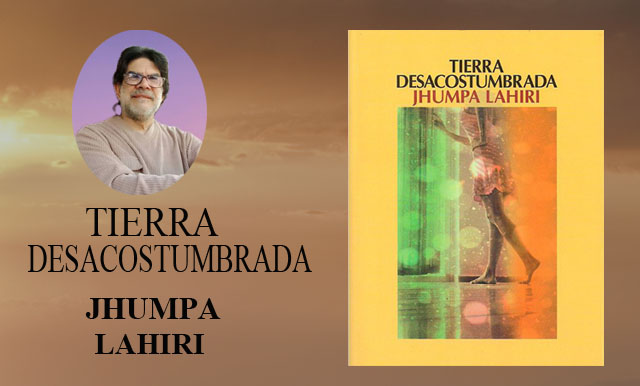
Jhumpa Lahiri es una escritora estadounidense de ascendencia hindú. Desde su primer libro de relatos, “interprete de emociones”, publicado en 1999, logró meterse en el corazón de los lectores. En sus textos nos acerca a las vivencias de los migrantes bengalíes en tierras norteamericanas.
En esta oportunidad comparto con ustedes otra obra de esta gran autora: “Tierra desacostumbrada”, del año 2008, y que fue reconocida como mejor libro del año por el prestigioso periódico “New York Times”.
Acá vuelve al mismo formato de su libro primigenio, en ocho breves relatos va entrelazando historias que a veces se continúan con los mismos personajes; otras, va profundizando en algún tipo de conflicto, padres e hijos, parejas, hermanos…
El tema transversal de estos textos son las dificultades que presenta la adaptación de una cultura conservadora, como lo es la bengalí, a otra completamente distinta, más liberal y abierta, como lo es la norteamericana.
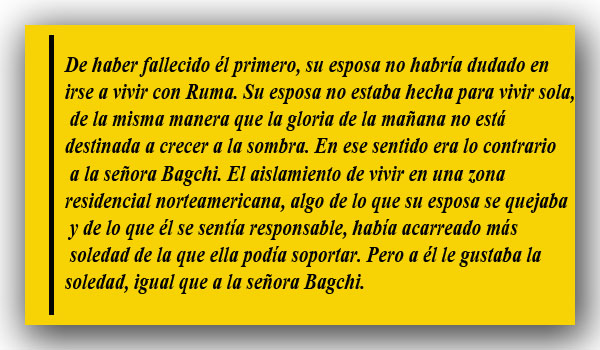
La autora hace énfasis en que sus personajes son producto de la imaginación. Sin embargo, todos mantienen una familiaridad muy cercana con su vida.
Al igual que sus padres todos los personajes provienen de familias acaudaladas de Bengala. No emigran a los Estados Unidos por carencias económicas, llegan a ese país para prepararse profesionalmente, para destacar en su área de conocimiento. Todos estudian en los mejores colegios y Universidades norteamericanas y de algún modo forman parte de una élite de primer nivel académico.
Esa característica de la primera generación de migrantes crea enormes presiones en las generaciones siguientes.
Los padres esperan que al igual que ellos sus hijos también sean unas personas que destaquen en el mundo del conocimiento, lo que se convierte en una permanente fuente de conflictos, porque la segunda generación ha crecido absorbiendo los valores de una sociedad que pregona la libertad del individuo y el respeto a sus decisiones, y exploran sus caminos personales de manera muy distinta a la que han pensado sus padres.

Este choque de perspectivas tiene consecuencias profundamente dramáticas. Los padres se sienten frustrados por las decisiones de sus hijos, y los hijos cargan con la culpa de haber defraudado las expectativas de los padres. Tanto a los hijos como a los padres les cuesta mucho encontrar el camino a la felicidad.
Pero la situación se complica mucho más en el caso de las mujeres.
La primera generación está compuesta por mujeres sometidas a las normas de la tradición. Todas forman su pareja mediante la figura de matrimonios concertados; desde jóvenes alguien decide por ellas el esposo que han de tener. En este tipo de uniones la relación no surge como producto del amor, puede que este aparezca o no más adelante, pero en el horizonte mental de la mujer bengalí vivir con alguien por amor no es una prioridad.
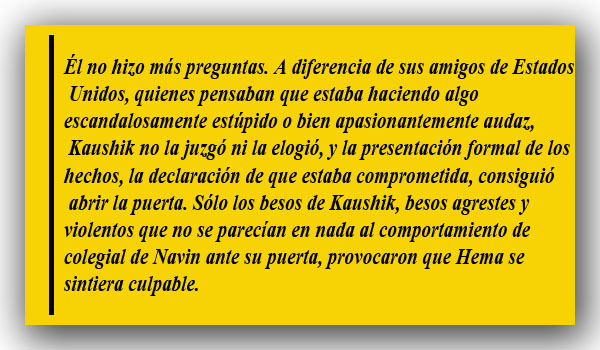
Esta tradición de los matrimonios concertados trata de mantenerse viva, de manera un poco velada, por la comunidad bengalí residente en suelo norteamericano. Los padres procuran que las hijas se relaciones solo con muchachos de otras familias bengalíes y el hecho de que alguna muchacha se enamore de un norteamericano se considera una catástrofe.
Desde el punto de vista literario la exploración de un conflicto como este abre muchas posibilidades, la autora nos muestra algunas alternativas: el caso de las hijas que llevan dos vidas tratando de aparentar que se someten a las exigencias de los padres; las que desafían abiertamente esa tradición y rompen con la familia para hacer su vida, y las que resisten algún tiempo pero al final se resignan a seguir el destino trazado por la tradición.
Muchos otros temas relacionados con la familia, con la búsqueda de la identidad, con encontrar un propósito en la vida, son tratados en los diferentes relatos.
Esta es una obra que se lee con mucha facilidad. La autora usa un lenguaje directo y tiene una gran habilidad para meternos en la piel de los personajes. En algunos relatos va construyendo la trama en un clima de permanente tensión donde la expectativa del lector se mantiene hasta el momento del desenlace.
Yo disfruté mucho la lectura de este libro, es de esos textos que admiten varias relecturas. En sus páginas aprendí mucho de la cultura bengalí, de sus tradiciones y de su forma de entender la vida. Es de esos libros donde la literatura integra muy bien la sociología y la antropología de los pueblos.
Si tienen la oportunidad déjense seducir por la prosa de esta autora, luego me cuentan.
Gracias por tu tiempo.
Fuente de la imagen de portada. I.
Todas las citas son tomadas de una versión que circula en la WEB.


Jhumpa Lahiri is an American writer of Indian descent. Since her first book of short stories, "Interpreter of Emotions", published in 1999, she has managed to get into the hearts of readers. In her texts she brings us closer to the experiences of Bengali migrants in North American lands.
In this opportunity I share with you another work of this great author: "Unaccustomed Land", from 2008, which was recognized as the best book of the year by the prestigious newspaper "New York Times".
Here she returns to the same format of her original book, in eight short stories that sometimes continue with the same characters; other times, she goes deeper into some kind of conflict, parents and children, couples, siblings...
The cross-cutting theme of these texts is the difficulties of adapting from a conservative culture, such as the Bengali one, to a completely different, more liberal and open one, such as the American one.
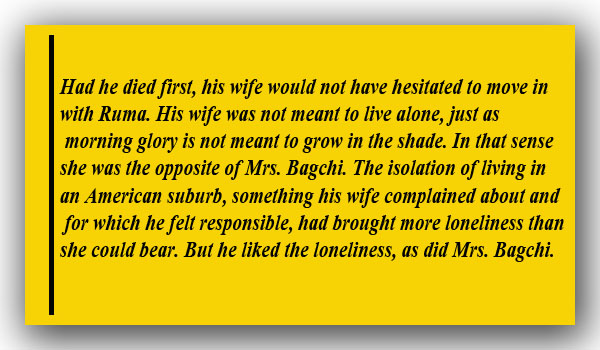
The author emphasizes that her characters are a figment of the imagination. However, they all maintain a very close familiarity with the author's life.
Like their parents, all the characters come from wealthy families in Bengal. They do not migrate to the United States because of economic deprivation, they come to the United States to prepare themselves professionally, to excel in their field of knowledge. They all study in the best American colleges and universities and in some way they are part of a first level academic elite.
This characteristic of the first generation of migrants creates enormous pressures on the following generations.
Parents expect that their children will also be people who excel in the world of knowledge, which becomes a permanent source of conflict, because the second generation has grown up absorbing the values of a society that proclaims the freedom of the individual and respect for his or her decisions, and they explore their personal paths in a very different way than their parents have thought.
This clash of perspectives has profoundly dramatic consequences. Parents are frustrated by their children's decisions, and children carry the guilt of having disappointed parental expectations. Both children and parents have a hard time finding their way to happiness.
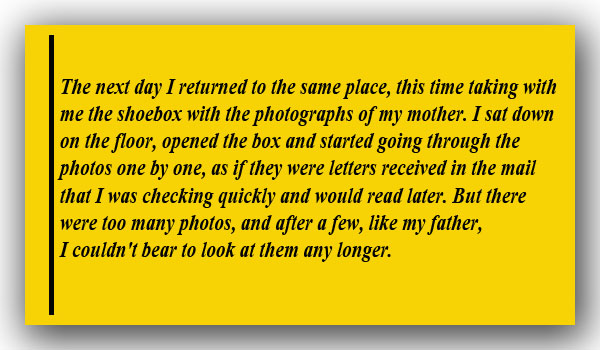
But the situation is much more complicated in the case of women.
The first generation is composed of women subjected to the rules of tradition. All of them form their partners through arranged marriages; from a young age, someone decides for them which spouse they will have. In this type of union the relationship does not arise as a product of love, it may or may not appear later, but in the mental horizon of Bengali women living with someone for love is not a priority.
This tradition of arranged marriages tries to be kept alive, in a somewhat veiled way, by the Bengali community residing on American soil. Parents see to it that their daughters have relationships only with boys from other Bengali families and the fact that any girl falls in love with an American is considered a catastrophe.
From a literary point of view, the exploration of such a conflict opens up many possibilities, the author shows us some alternatives: the case of daughters who lead two lives trying to appear to submit to the demands of the parents; those who openly defy that tradition and break away from the family to make their own lives, and those who resist for some time but in the end resign themselves to follow the destiny traced by tradition.
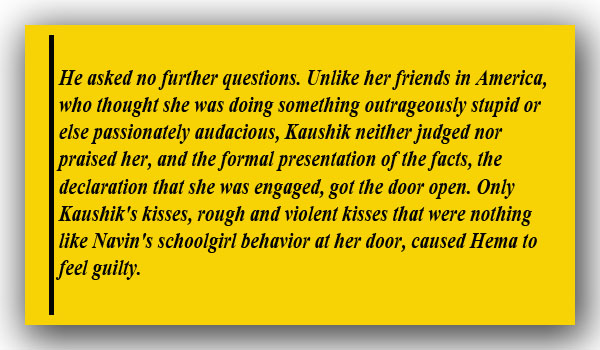
Many other themes related to family, to the search for identity, to finding a purpose in life, are dealt with in the different stories.
This is a work that reads very easily. The author uses direct language and has a great ability to put us in the skin of the characters. In some stories she builds the plot in a climate of permanent tension where the reader's expectation is maintained until the moment of the denouement.
I enjoyed reading this book very much, it is one of those texts that can be reread several times. In its pages I learned a lot about Bengali culture, its traditions and its way of understanding life. It is one of those books where literature integrates very well the sociology and anthropology of the people.
If you have the opportunity, let yourself be seduced by the prose of this author, then let me know.
Thank you for your time.
Translated with www.DeepL.com/Translator (free version)

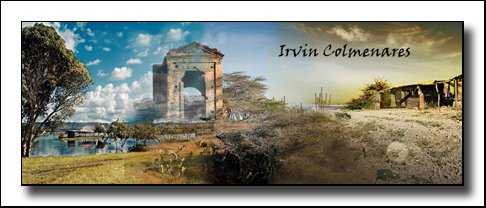






Comunidad Be Entrepreneur

Uprooted ness is latent throughout the novel, “they belong to that place as I will never belong to any other”, as one of the characters expresses it with a sense of nostalgia. They need to belong to a place they can call home.
I particularly remember the second part, where the story begins in the childhood of one of her characters; it continues in her youth and ends in Rome when she is an expert on the classical world, researching the Etruscan civilisation, and he is a war photographer about to hang up his cameras. These pages constitute a literary treasure that will generate constant emotions in the reader. Her journey to the Tuscan city of Volterra, wounded, lonely, magnificent; full of Etruscan magic-ghosts, will be something very difficult to forget for all those who accompany the author in these pages.
Literature has always been the immortalised medium of history and today, it is the way that expands our brains to those places-moments that we dream of visiting and that although a photograph visually gathers those details, the narrative enriches it and makes us travel in time.
Here I am, active again, enjoying your literary adventures. A hug from afar.
It is a very emotional novel. I'm glad you're back. Thanks so much for stopping by and commenting dear @amigoponc . A big hug from Maracay.
¡Felicidades! Esta publicación obtuvo upvote y fue compartido por @la-colmena, un proyecto de Curación Manual para la comunidad hispana de Hive que cuenta con el respaldo de @curie.
Si te gusta el trabajo que hacemos, te invitamos a darle tu voto a este comentario y a votar como testigo por La Colmena.
Si quieres saber más sobre nuestro proyecto, te invitamos a acompañarnos en nuestro servidor de Discord.
Muchas gracias por el apoyo.
Congratulations @irvinc! You have completed the following achievement on the Hive blockchain And have been rewarded with New badge(s)
Your next target is to reach 55000 upvotes.
You can view your badges on your board and compare yourself to others in the Ranking
If you no longer want to receive notifications, reply to this comment with the word
STOPTo support your work, I also upvoted your post!
Thank you so much my dear friend.
That's great @irvinc! We're excited to see your progress on Hive! We can't wait to see you achieve this next one!
I guess their stories aren't always completely fiction. I write stories too and mostly draw ideas from what has happened in my life.
This book would be a great read. Was it originally written in the English language? I love the conflict in the book. That feeling when children take different paths from what the parents expected is conflict enough and is heartbreaking. I know that in the end, the parents have to accept what is reality. Thanks for sharing this piece.
Yes, the book was originally written in English. The theme of migration and parent-child conflicts is always present in literature. Thank you very much for stopping by and for the esteemed support dear @teknon . A big hug from Maracay.